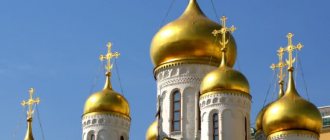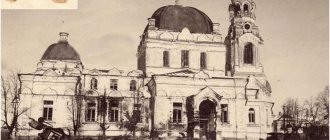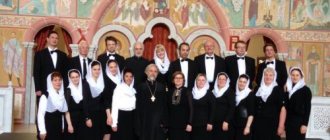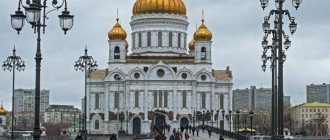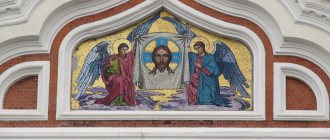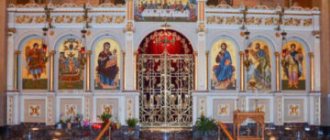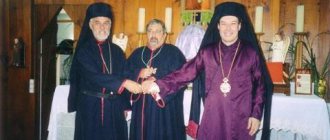Establishment of the autocephalous Russian Church
ESTABLISHMENT OF METROPOLITAN JONAH
What was left to do? Wait for more favorable circumstances? But Russia had already waited a very long time and remained without a metropolitan for about seven years. Moreover, it was unknown whether such circumstances would come or soon would come in Constantinople. And so Vasily Vasilyevich decided on the last resort that he had left - he decided to convene all the bishops of his land and propose to them that they themselves appoint a metropolitan for Russia, and namely Jonah, Bishop of Ryazan, as he had been chosen even earlier. At the call of the Grand Duke, the bishops arrived in Moscow: Ephraim of Rostov, Avramiy of Suzdal, Varlaam of Kolomna, Pitirim of Perm, and the bishops - Euthymius of Novgorod and Ilya of Tver sent their letters, in which they expressed their consent to the installation of Jonah as metropolitan. The cathedral opened in the Church of St. Michael the Archangel, and in addition to the saints, many archimandrites, abbots and other clergy were present here. First of all, we turned to the rules of the holy apostles and councils and found that these rules not only do not prohibit, on the contrary, they command the bishops of a certain region to appoint a greater saint or metropolitan. They felt that in Russia this required the consent and blessing of the Constantinople Patriarch, and they referred to the fact that the Patriarch with his consecrated Council had long blessed Jonah to be Metropolitan after Isidore, when Jonah went to Constantinople. They recalled that in Russia, out of necessity, metropolitans had previously been installed by a Council of their bishops: Hilarion under Grand Duke Yaroslav and Clement under Izyaslav. As a result of all this, Jonah, Bishop of Ryazan, was appointed metropolitan on December 5, 1448. The very arrangement consisted in the fact that when Jonah performed the Divine Liturgy, the metropolitan omophorion was placed on him, and the great metropolitan staff, a symbol of metropolitan power, was given into his hands. This was the first metropolitan appointed by his bishops in Moscow itself, while the previous two experiments were carried out in Kyiv.
The appointment of Metropolitan Jonah, although it had all the properties of legality, but as something out of the ordinary, it naturally should have attracted attention and aroused opinions and rumors. Therefore, the saint himself was aware of the need to clarify the meaning of this event for believers. As soon as he ascended to his cathedra, in his district letter to all Russian Christians he wrote, among other things: “You know, children, how many years the Church of God has been a widow without a greater saint, without a metropolitan, and that is why much trouble and languor has been caused to the Christianity of our land. And now, by the will of God, the bishops, archimandrites, and abbots gathered at the sacred Council with all the great priesthood of God of our land and, remembering the previous command of the holy king about us and the blessing of the holy Ecumenical Patriarch and the entire holy Ecumenical Council, they appointed me metropolitan according to the Divine rules and according to the thought of the lord, my son Grand Duke Vasily Vasilyevich and his younger brethren - the princes, who, while Orthodoxy was in Constantinople, received both the blessing and the metropolitan from there.”
Macarius (Bulgakov) Metropolitan of Moscow and Kolomna. History of the Russian Church. Book 3. Section 2. Chapter 1. https://magister.msk.ru/library/history/makary/mak3201.htm#number
“BUT THE AGREEMENT WAS NOT ACCEPTED IN MOSCOW...”
Under the long-suffering Prince Vasily Vasilyevich, an important event took place in the life of the Russian church. As is known, in 1439, at a council of Orthodox and Catholic clergy in Florence, the union of the Eastern and Western churches was accomplished. The Emperor and the Patriarch of Constantinople sought this union, hoping that when the church strife between East and West was destroyed, then the Pope and Western sovereigns would help the Greeks in their fight against the Turks. Perishing from the Turks, the Greek authorities were ready to make all sorts of concessions to the pope, and the union was therefore structured in such a way that the Greeks retained their church rites, but recognized all Catholic dogmas and the primacy of the popes. At the very time when preparations were being made for the council in Constantinople, it was necessary to appoint a metropolitan to Rus'. They appointed a Greek scholar, very inclined towards union, Isidore. Having arrived in Moscow, he immediately began to prepare for a council in Italy, went there with a large retinue, and there he became one of the most zealous advocates of union with Latinism. Kindly received by the pope, he returned to Moscow in 1441 and announced an agreement with Rome. But in Moscow the agreement was not accepted, since the Greeks themselves had been instilling hatred of Catholicism in Russians for centuries. Isidore was taken into custody and managed to escape, “went out without a door,” fled to Lithuania and from there moved to Italy. And in Moscow they decided to separate from the Patriarchate of Constantinople, which betrayed Orthodoxy to the pope, and henceforth to appoint a metropolitan for themselves by electing a council of Russian bishops. According to the new order, Ryazan Bishop Jonah was installed as metropolitan of Moscow. At the same time, in southwestern Rus', in the old Kyiv metropolis, special metropolitans were established, still appointed from Constantinople.
Platonov S.F. A complete course of lectures on Russian history. SPb., 2000 https://magister.msk.ru/library/history/platonov/plats003.htm#gl15
CHURCH AFFAIRS
[1448] By his last misfortune, as if reconciled with fate and in blindness showing more State foresight than hitherto, Vasily began to assert his power and the power of the Moscow Principality. Having restored calm within it, he first of all gave the Metropolitan of Russia, whom we had not had for eight years due to the strife of the Constantinople Clergy and our own turmoil. Bishops Ephraim of Rostov, Avramy of Suzdal, Varlaam of Kolomna, Pitirim of Perm gathered in Moscow; and Novogorodsky and Tverskoy sent letters, expressing their agreement with them. They, to please the Sovereign, ordained Jonah as a Metropolitan, allegedly referring, as stated in some chronicles, to the blessing given to him (in 1437) by the Patriarch; but Jonah, in his letters, written by him at the same time to all the Bishops of Lithuanian Russia, says that he was elected according to the charter of the Apostles by the Russian Saints, and strictly reproaches the Greeks by the Florence Council. At least from that time we became completely independent from Constantinople in church affairs: which serves to the honor of Basil. The spiritual care of the Greeks cost us very dearly. Over the course of five centuries, from St. Vladimir to the Dark, we find only six Russian Metropolitans; In addition to the gifts sent to the Kings and Patriarchs, the foreign High Hierarchs, always ready to leave our fatherland, took, as likely as not, measures for this case, accumulated treasures and sent them to Greece in advance. They could not even have ardent zeal for the State benefits of Russia; they could not respect its Sovereigns as much as our fellow citizens. These truths are obvious; but the fear of touching the Faith and seducing the people by a change in its ancient customs did not allow the Grand Dukes to free themselves from the bonds of spiritual Greek power; the disagreements of the Constantinople Clergy on the occasion of the Florence Council presented Basil with the opportunity to do what many of his predecessors wanted, but were afraid of. — The election of the Metropolitan was then an important matter of state: he served the Grand Duke as the main instrument in curbing other Princes. Jonah tried to subjugate the Lithuanian Dioceses to himself: he proved to the local Bishops that the successor of Isidore, Gregory, was a Latin heretic and false shepherd; however, he did not achieve his goal and only aroused the anger of Pope Pius II, who, with an immodest Bull (in 1458), declared Jonah an evil son, an apostate, and so on.
Karamzin N.M. History of Russian Goverment. T.5. Chapter III https://magister.msk.ru/library/history/karamzin/kar05_03.htm
SWORD OF THE SPIRITUAL
If the Russian clergy, in the person of its representative, the metropolitan, so greatly contributed to the exaltation of Moscow, then it equally powerfully contributed to the establishment of autocracy, for at that time the clergy, more consciously than other classes, could look at the aspirations of the great princes of Moscow and fully appreciate this aspiration. Imbued with the concepts of royal power, power received from God and not dependent on anyone or anything, the clergy therefore had to be constantly in a hostile attitude towards the old order of things, towards tribal relations, not to mention the fact that strife The princely ones were in direct opposition to the spirit of religion, and without autocracy they could not stop. That is why, when the Moscow princes began to strive for autocracy, their aspirations completely coincided with the aspirations of the clergy; we can say that along with the secular, grand-ducal sword, the spiritual sword was constantly directed against the appanage princes
What does the term “autocephaly” mean?
Before talking about what an autocephalous Orthodox Church means, we should consider the term “autocephaly” itself. It comes from a Greek word consisting of two roots. The first of them is translated as “himself”, and the second is “head”. It is not difficult to guess that their combined use can mean “self-leadership,” which implies the most complete control of the entire internal life of the church and its administrative independence. In this way, autocephalous churches differ from autonomous churches, which are subject to certain legal restrictions.
The universal church is divided into local (autocephalous) churches not on a national basis, but on a territorial basis. This division is based on the words of the Apostle Paul that in Christ there is no division of people either by nationality or by their social status. All people constitute one “flock of God” and have one Shepherd. In addition, an undeniable convenience is the territorial correspondence of autocephalous churches to the political and administrative borders of states.
Favorable coincidence of circumstances
Fortunately, the political situation soon developed in such a way that it excluded the possibility of such a negative scenario developing. First of all, Metropolitan Jonah played into the hands of the fact that the attempts of Metropolitan Isidore, who fled to Lithuania, to remove the western dioceses from the control of the Moscow Metropolis and persuade their population to accept the union ended in failure. He was prevented from doing this by the Polish king Casimir IV, who, by coincidence, broke off relations with Pope Eugene I during this period.
When he died in 1447, Pope Nicholas V became head of the Catholic Church, and King Casimir IV restored relations with Rome. However, even at this stop, the fugitive Isidore was unable to realize his insidious plans, since the idea of union found fierce opponents in the representatives of the Polish clergy.
The futile labors of the Ryazan bishop
In order to gain a foothold on the princely throne, Shemyaka needed the support of the clergy, and for this purpose he planned to make Bishop Jonah of Ryazan Metropolitan of Moscow. This choice was by no means a consequence of his personal sympathies, but the result of a subtle calculation. The fact is that Bishop Jonah twice previously tried to lead the Russian church, but both times he was unsuccessful.
In 1431, when Metropolitan Photius died, he claimed his place, but the Patriarch of Constantinople, who personally elevated him to the metropolitan rank, gave preference to the Smolensk bishop Gerasim. Four years later, when, due to his death, the position of primate of the Russian church again became vacant, Jonah hurried to Constantinople for the patriarchal blessing, but was too late. He was preceded by the same Metropolitan Isidore, who, by signing the Union of Florence, basely betrayed the interests of the Orthodox Church.
Intermediate nature of autonomy status
History shows that the status of autonomy of churches is usually temporary, interim. As a rule, over time, they either become autocephalous local Orthodox churches, or, having lost even the appearance of independence, they are transformed into ordinary metropolitan districts or dioceses. There are many examples of this.
Today, three autonomous churches are commemorated in liturgical diptychs. The first of them is the ancient Sinai. It is governed by a bishop appointed from Jerusalem. Next comes the Church of Finland. For her, the Mother Church became the Autocephaly of Constantinople. And finally, the Japanese, for which the Russian Orthodox Church is kyriarchal. The light of Orthodoxy was brought to the islands of Japan at the beginning of the last century by a Russian missionary, Bishop Nikolai (Kasatkin), who was later canonized. For his services to the church, he was awarded the honor of being called Equal-to-the-Apostles. Such a title is given only to those who brought Christ’s teaching to entire nations.
All these churches are Orthodox. As absurd as it is to look for the difference between the autocephalous church and the Orthodox, it is so absurd to talk about the difference between the autonomous and the Orthodox. The need for such an explanation is caused by frequently asked questions about this.
Support of the Polish king
For this reason, and perhaps due to certain political considerations, Krakow decided to support Metropolitan Jonah and the establishment of autocephaly of the Russian Church. In 1451, Casimir IV issued a personal charter in which he officially recognized the legitimacy of the decisions of the Moscow Church Council of 1448, and also confirmed the rights of the newly elected primate to all temple buildings and other property of the Russian Orthodox Church located within the Polish state.
Significant restrictions on the freedom of autonomous churches
Autonomous churches, in addition to being governed by a primate appointed by the mother church, were obliged to coordinate their charters, statuses with it, and consult on all any serious issues. They did not have the right to consecrate the ointment on their own. Their bishops were subject to the jurisdiction of the highest court - the court of the kyriarchal church, and they had the right to build their relations with others only through the mother church. All this gave rise to organizational difficulties and hurt national pride.
Monk from Kostroma region
Considering the role that Metropolitan Jonah played in the history of the Russian Church, it is worthwhile to dwell in more detail on his personality. The future bishop was born in the village of Odnoushevo, not far from Kostroma. The exact date has not been established, but it is known that he was born in the last decade of the 14th century. The name given to him at birth by his mother and father, the service landowner Fedor, has not reached us either.
However, it is known for certain that the future Metropolitan Jonah felt a desire to serve God from early childhood and at the age of 12 he took monastic vows in a small monastery near the city of Galich. After living there for several years, he moved to the Moscow Simonov Monastery, where he served as a baker.
The struggle for the grand ducal throne
After his arrest and subsequent escape, the position of head of the Russian metropolitanate remained vacant due to a number of political and military upheavals that befell the state. In 1445, the Russian lands were engulfed in an internecine war for the grand-ducal throne that broke out between Vasily II and Dmitry Shemyaka, which Khan Ulug-Muhammad did not fail to take advantage of. Hordes of Tatars invaded the Moscow principality and, having defeated a Russian squad in the battle of Suzdal, captured the prince himself. As a result, the grand-ducal throne became easy prey for his competitor.
Grand Duke's message
Isidore still tried to intrigue as best he could and even turned to the Kyiv prince Alexander for military help, but no one took him seriously anymore. It was much more important for Metropolitan Jonah to achieve his recognition by Constantinople, since the attitude of the entire Orthodox world towards him largely depended on this. The initiative in resolving this issue was taken by the Grand Duke of Moscow Vasily II.
In 1452, he sent a message to the Byzantine Emperor Constantine XI, in which he very thoroughly outlined the reasons that prompted the Russian bishops to elect a metropolitan, bypassing the then prevailing tradition. In particular, he wrote that “it was not insolence” that forced them to neglect the blessing of the Patriarch of Constantinople, but only the extraordinary circumstances that had arisen at that time. In conclusion, Vasily II expressed his desire to continue to maintain close eucharistic (liturgical) communion with the Byzantine Church for the sake of the triumph of Orthodoxy.

